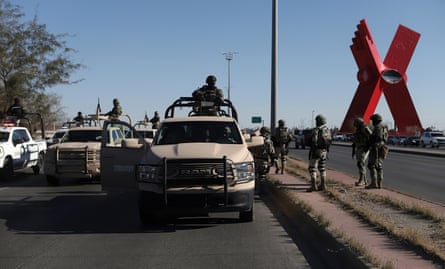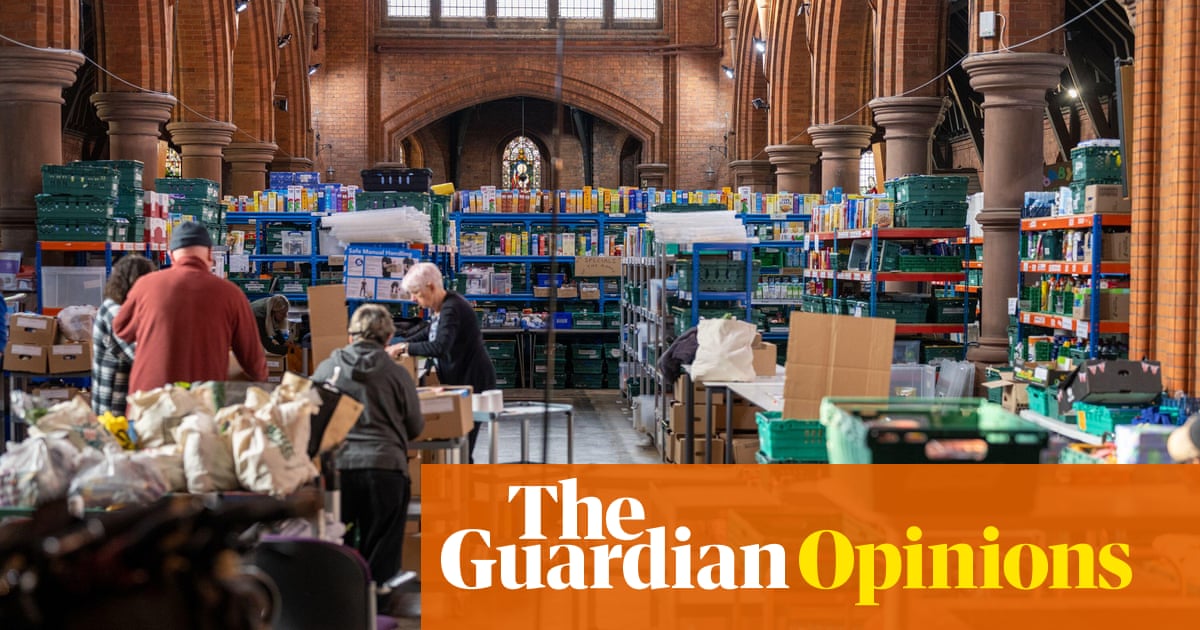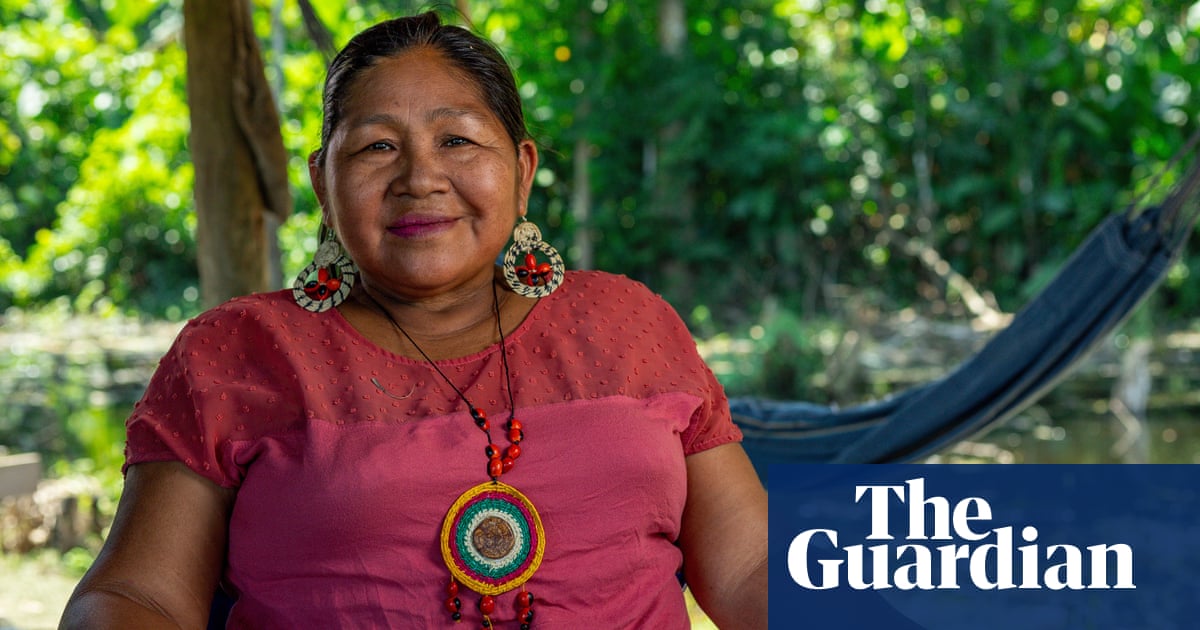It is cold and quiet in Casa del Migrante, a shelter in Ciudad Juárez, on the US-Mexico border. A group of men play dominoes, another shoots hoops alone, and a young couple watch their kids play with superhero toys.
“Some people get here and don’t want to go back outside,” said Ivonne López, a social worker. “They’re afraid.”
With Donald Trump’s return to power, the rules of US immigration are set for drastic change. While border cities like Juárez prepare for possible mass deportations, criminal groups are lying in wait to kidnap and extort migrants – and also offer them a way back across the border.
Besides deportations, Trump wants to cancel CBP One, the app that migrants in Mexico use to arrange US asylum appointments, and to bring back the so-called Remain in Mexico policy, under which asylum seekers were forced to wait in dangerous border cities while their applications were processed.
The incoming administration also reportedly wants to revive Title 42, the pandemic-era public health policy that expelled people almost 3m times without letting them request asylum.
Experts say that each of these moves would increase the number of migrants in Mexico’s border cities. Taken together, their effect could be overwhelming.
Yet on the eve of Trump’s inauguration, Juárez is oddly calm.
“We do not currently have a strategy for the massive deportation of migrants from the United States because there is no information,” said Enrique Serrano, general coordinator of COESPO, the state-level agency for migration, which he added was mostly the remit of the federal government.
“The range of possibilities is very wide: they could deport 1,000, or 100,000 or millions,” he added. “We cannot make strategies for every level of expectation. We are going to wait.”
There is some slack in the system: roughly half of the 2,700 beds in shelters across Juárez are unoccupied. This has been true across Mexico’s border cities since CBP One was made available elsewhere in Mexico. Meanwhile officials have strived to contain migrants in the south.
Serrano said the federal government would set up three encampments in Juárez if needed, where deportees would be processed before Mexicans are offered free bus transport to anywhere in the country. Foreigners, on the other hand, “will not be able to circulate freely”.
Tijuana, another border city, recently declared an emergency over the potential mass deportations. Serrano said now wasn’t the moment for Juárez to do the same: “There is no panic, no emergency.”
Civil society organisations, which provide more than half the shelter capacity in Juárez, were less sanguine about what lies ahead.
“Trump and his team now know which policies worked – and how to make them tougher,” said Blanca Navarrete, director of Derechos Humanos Integrales en Acción.
Casa del Migrante, which is currently at a third of its 560-person capacity, is fitting out extra spaces and stocking up on essentials. At one point in Trump’s last term they made room for 1,138 migrants.
What the deportees will want to do is another unknown. They left home for a reason, be it poverty or violence, and to think that they will just go back is “delusional”, said Navarrete.
Serrano said COESPO was anticipating “that the majority will want to return to the US”.
“And [criminal groups] will try to capture them as a market for their migration services,” he added.
In early January, authorities discovered a 40-metre tunnel running from Juárez to El Paso, Texas. Adverts on social media offered to spirit migrants under the border wall in 20 minutes for $5,000. The entrance was in a plaza near a colossal sculpture in the form of a red “X”.

“The fact that this tunnel was in plain sight makes you wonder where else there might be tunnels,” said Ciela Ávila, also from Derechos Humanos Integrales en Acción.
Mexico’s organised crime groups have increasingly diversified into the migrant economy. For some, the income from migrants now rivals that from drugs.
These groups might tax coyotes or directly smuggle people themselves. But they also extort, kidnap, and sometimes traffic people for sex work or forced labour in the agricultural sector.

This has made migrants’ journeys more violent and terrifying.
Criminal groups often kidnap people from bus stations and airports. Authorities have found safe houses with more than a hundred migrants crammed into them. Torture, sexual assault and murder have been documented.
Most of the people arriving at Casa del Migrante have been kidnapped at some point in their journey through Mexico, said López.
Some traffickers have even tried to infiltrate their shelter. “In the past, people have arrived saying they were families. But when you do the interviews at reception you realise that the man is not actually the father,” said López.
López said it was a strategy of the traffickers to keep their clients – or victims – under their control. But it also gives them access to others in the shelter.
“We try to protect the migrants as much as we can,” said López. “But maybe others have gotten in here and we didn’t even realise.”
Organised crime groups will be watching Trump’s policies closely. “They’re aware of the shifts in the US and they will use them to their benefit, as they have in the past,” said Parker Asmann of Insight Crime.
During Trump’s first term, Remain in Mexico and Title 42 kept vulnerable people stranded in border cities, and proved a boon for organised crime.
Now these groups have developed an appetite for the business – and may soon have an even bigger population delivered to them.
Trump’s migration policies could end up lining the pockets of organised crime groups – strengthening the very cartels he has promised to “wage war” on.
“We’ve repeatedly asked the authorities what they are doing about the kidnappings [of migrants],” said Navarrete. “The national guard told us that they were putting together a plan, but we never heard more about it.
“In other words, there is no plan.”

 2 months ago
50
2 months ago
50













































